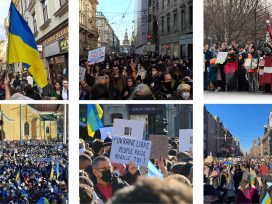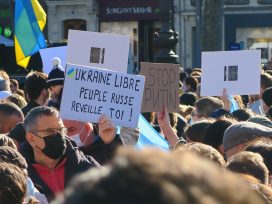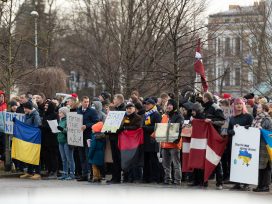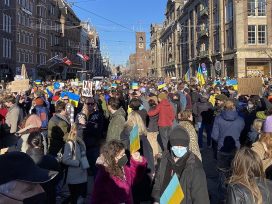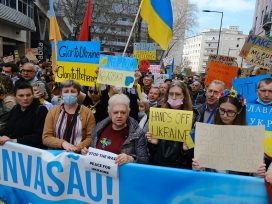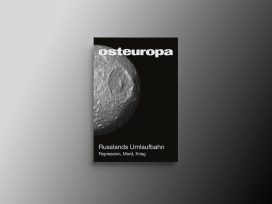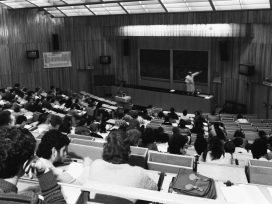The power of smaller countries
Ukraine’s resistance to Russia’s imperialist war has discredited the spheres of influence theory once and for all. The EU is being forced to reappraise not just its security policy, but also its colonial mindset towards smaller countries beyond its borders. Part of the series ‘Lessons of war: The rebirth of Europe revisited’.
After well over a year of resisting the Russian invasion, Ukraine is showing no intention of negotiating with the aggressor. The resolve of the Ukrainian armed forces in their defence of the nation’s sovereignty and territorial integrity remains unbroken. In this they benefit from the unanimous support of society and the backing of a largely united political elite. Every other dimension of Ukrainian society, be it economic, social or academic, is also geared to resist Russia’s plans for their country.
The Global West has played a role in delivering this outcome, to be sure. But in this war, Ukraine was the prime mover and the first to set its goals; the West merely reacted. Ukraine asserted its agency; Europe and its allies chose to support the invaded country in achieving its goals. That has included financial, political and military assistance. A different choice would have led Europe further down the path of self-harm in its relations with Russia.
The reasons for Europe’s decision went beyond the need to secure its eastern flank. After the initial confusion, Europe and Ukraine aligned their political interests: Russia will not get to carry out its imperialist agenda. Nor will Russia set a precedent for other authoritarian regimes. Ukraine has firmly pushed the East-West divide to its Russian borders.
Gone is the age of the buffer zone between NATO and Russia. In that realist utopia, ‘buffer’ countries or ‘small states’ were considered too confused in their identity to have clear aspirations that challenge ‘great power equilibrium’. Ukraine’s stance in this war has made that scenario untenable. Along the way, post-colonial Europe and the United States are being made to witness the power of smaller countries.
By no longer ignoring Ukraine’s fight for sovereignty and independence, Europe has shown its willingness to abandon the ‘spheres of influence’ principle that had led it to capitulate to Russia’s ‘security concerns’. Western Europe no longer considers ‘great power’ claims legitimate – a view the countries of central and eastern Europe never shared. Ukraine has forced Europe not only to adapt to contemporary security requirements, but also to accelerate its decolonizing agenda.The conversation is now a few steps further from where Jürgen Habermas and Jacques Derrida left it in 2003, when they called for Europe to overcome its colonial power tendencies. But it is also a long way from complete transformation. Europe exists but a clear transnational European identity has yet to appear.
Going further, EU adaptation requires not only winning the war, but also winning the peace. It means securing long-term EU-US investment in Ukraine’s post-war democratic reconstruction. In order to create the political space for a denser cooperation with Ukraine, the EU will need to take even bolder steps towards a rejection of Eurocentrism and power hierarchies in foreign policy.
Adaptation also means revising the EU enlargement process to involve Ukraine, Moldova, Georgia and the countries of the western Balkans in EU decision-making from the outset. And it means engaging in self-reflection to understand why the Global South and the Global East is not sympathetic to Ukraine’s fight for sovereignty and independence.
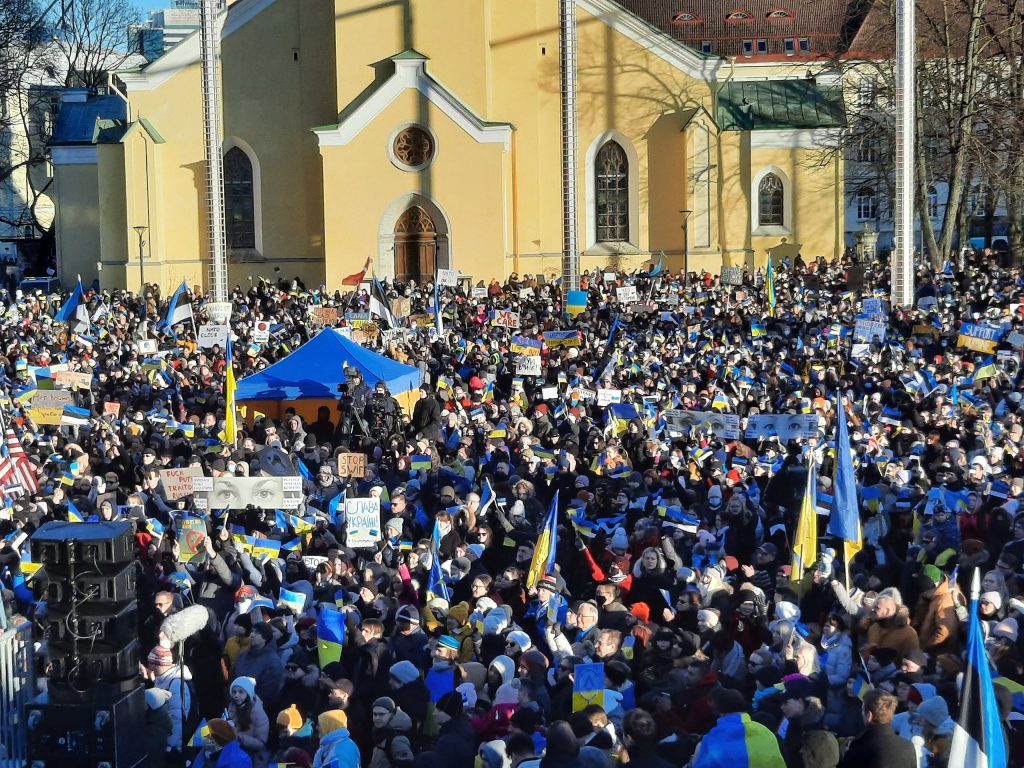
Tallinn 26 February 2022. Metsavend, CC BY-SA 4.0 via Wikimedia Commons
How Ukraine ended the buffer zone system
Grand strategies that entail buffer zones and spheres of influence, and that refer to small countries’ expendable agency as opposed to great powers’ national interests, are part of imperialist or colonial legacies. This is the type of discourse that Russia uses and understands. When Ukraine, Moldova, Georgia and most recently Belarus started showing increasing interest in a democratic, European and NATO-protected future, Russia developed ‘security concerns’.
Those concerns were unfounded. The Global West was not a threat to Russia. On the contrary, European powerhouses such as Germany and the United Kingdom were its business partners. Throughout the 1990s, Russia was also a partner in peace for NATO. But the subsequent amplification of democratic demands in neighbouring countries created a precedent that threatened Vladimir Putin and his authoritarian regime.
Western European leaders took Russia’s concerns into account and kept the eastern neighbourhood at arm’s length. The region existed in a geopolitical grey zone. The EU and NATO occasionally gestured towards an open-door policy towards these countries, rhetorically celebrating agency and democratizing efforts, but never followed through with actions.
The closest the West came to considering stronger ties with Ukraine was at the NATO Bucharest Summit in 2008, when some heads of state, including US President George W. Bush Jr, supported Ukraine and Georgia becoming NATO members. No concrete action resulted from this. France, Germany and other western European states strongly opposed the initiative, citing Russia’s ‘security concerns’. Neither Ukraine nor Georgia was offered a Membership Action Plan, nor did the summit declaration generate a NATO agenda focused on further enlargement. Ukraine and Georgia have been marginal participants in NATO’s plans ever since.
Russia’s invasion of Georgia in 2008 did not galvanise NATO into spending more on its own military capabilities, let alone on those of countries like Ukraine, Georgia or Moldova. US aid for Georgia after the invasion was focused on reconstruction and was not intended to include military aid. Even after February 2022, the former German chancellor Angela Merkel stood by her decision to oppose a Membership Action Plan for Ukraine after 2008.
Only now, with its determination to fight Russia, has Ukraine finally terminated its status as pillar of the buffer zone system.
Winning the peace
Ukrainian society is now set on a fast, transformational track. Ukrainians are choosing the European identity that Habermas and Derrida called for. Now is the time for Europe to identify with Ukrainians and to answer Ukraine’s call for union.
That choice might seem to contradict the pacifist argument made by Habermas and Derrida in the context of the Iraq invasion. But it is consistent with their larger message. Should Europe decide that a free and intact Ukraine is no longer in its interest and cease to participate in creating the environment for Ukraine to achieve its goals, Ukraine will lose the war. The result will not be a docile population, happy to give up on its sovereignty and territory in exchange for personal safety. Rather, a heavily armed and war-forged country will descend into social and political chaos. In that scenario, Russia wins and Europe loses.
But winning the war is not enough. To win the peace, Europe needs to accelerate its decolonizing foreign policy agenda and oppose the existence of an international pecking order. It must admit its error in accepting the ‘spheres of influence’ theory and redefine its geopolitical role.
Revisiting the way in which the enlargement policy functions is fundamental to that agenda. Years of providing (insufficient) aid to Moldova, Ukraine and the Western Balkans have shown that financial assistance is not a catalyst for change. Candidate countries need to be treated as equals and be involved in EU decision-making and legislation from the start of accession negotiations.
In this alternative world, a state like North Macedonia would not need to pass the last hurdles towards full membership to participate in EU decision-making in the other ‘provisionally closed’ chapters. Involving the candidate countries in restructuring various EU policy areas before accession with full voting rights would put the relationship between the EU and prospective new members on more equal footing. It would also help the accession process regain some of the credibility it has lost after years of broken promises in the Western Balkans.
Europe’s problems are not the world’s
The neutral or anti-western stance of the countries of the Global South in the Russia-Ukraine war is a further call for Europeans to reconsider their colonialist world view, to acknowledge their mistakes and better explain their intentions.
Even though the term ‘Global South’ does not capture the diversity among the countries it aggregates, most are united by a common position on the Russia-Ukraine war. They refuse to take sides and even blame the West for overreaching yet again. According to polls, over 60 percent of the world population is either neutral or Russia-leaning. These opinions are overwhelmingly found in the countries of Latin America, Africa and Asia. No country from Africa or Latin America has placed sanctions on Russia. The West is becoming increasingly isolated.
But this is not only the outcome of a historical mistrust of western Europe and the United States. It is also the result of European and American driven misinformation and pro-imperialist apologism. The narrative that the EU and NATO expanded too far into the Russian ‘sphere of influence’ has been widely popularized by public figures and decision makers in the West who maintain the colonial world-view according to which the rights and national interests of ‘great powers’ supersede those of ‘small states’.
To counter the influence of such narratives, Europe should invest vast economic and diplomatic resources in informing and involving Global South leaders and publics in its decision making. This way Europe can show it no longer overlooks the agency of the states to whom it had previously conferred a subaltern ‘small nation’ status.
Instead of casting themselves as being in a position of control, westerners should acknowledge, to a global audience, that Ukrainians have been fighting alone for their independence from Russian interference for decades, without EU or NATO assistance. The West should also acknowledge that the countries of the Global South have legitimate concerns about joining a western led global order that has not been updated to include the developing world’s security and economic concerns. A successful European foreign policy would encourage the Global South to hold the West accountable for its lack of openness towards Ukraine’s requests for assistance and inclusion before the 2022 invasion.
Conclusion
It should be apparent to all decision makers that the Ukrainians are preparing to win the war. To deliver that victory, they will do what they see fit, for as long as they can, and to the best of their military and political abilities. This implies a determined refusal of any negotiations; the Ukrainians do not want to build their enemy a golden bridge across which to retreat. Any view that does not acknowledge Ukraine’s demand as just, and does not understand the debt of support the West has accrued towards what it has long perceived as small and expendable nations, remains beholden to the colonial agenda.
Europe’s post-colonial future will be determined by how it acts and how it sees itself emerging from the battle for Ukraine. The outcome of that battle will not be determined only on the eastern front. It will also be a battle for Ukraine’s peace.
Europe’s response to Ukraine’s call to support its democratic post-war reconstruction is not optional. Were Europe to disappoint Ukraine, it would mean it had given up its nascent resistance to its own and others’ imperialist tendencies. Ukraine’s independence, sovereignty, democracy and post-war stability are Europe’s to lose.
Published 24 July 2023
Original in English
First published by Eurozine
© Veronika Anghel / Eurozine
PDF/PRINTIn collaboration with
In focal points
Newsletter
Subscribe to know what’s worth thinking about.
Related Articles
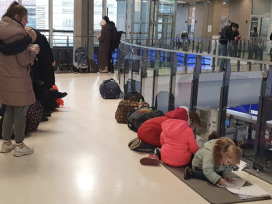
'It’s important to be open'
A Knowledgeable Youth podcast
Remaining in a new country or returning home? The Knowledgeable Youth podcast delves into the complex decision-making refugees face when migrating, together with researcher Olena Yermakova.

The difference between knowing from distance that war is being waged and living that reality couldn’t be more extreme. But can awareness of multiple repercussions turn protective disassociation from violence into active solidarity? ‘The Most Documented War’ symposium in Lviv, Ukraine, provides valuable pointers regarding engagement and responsibility.
